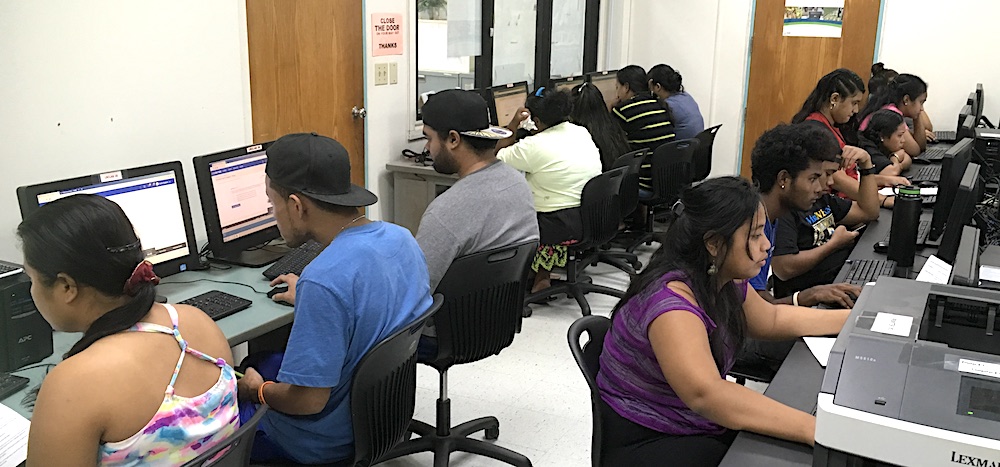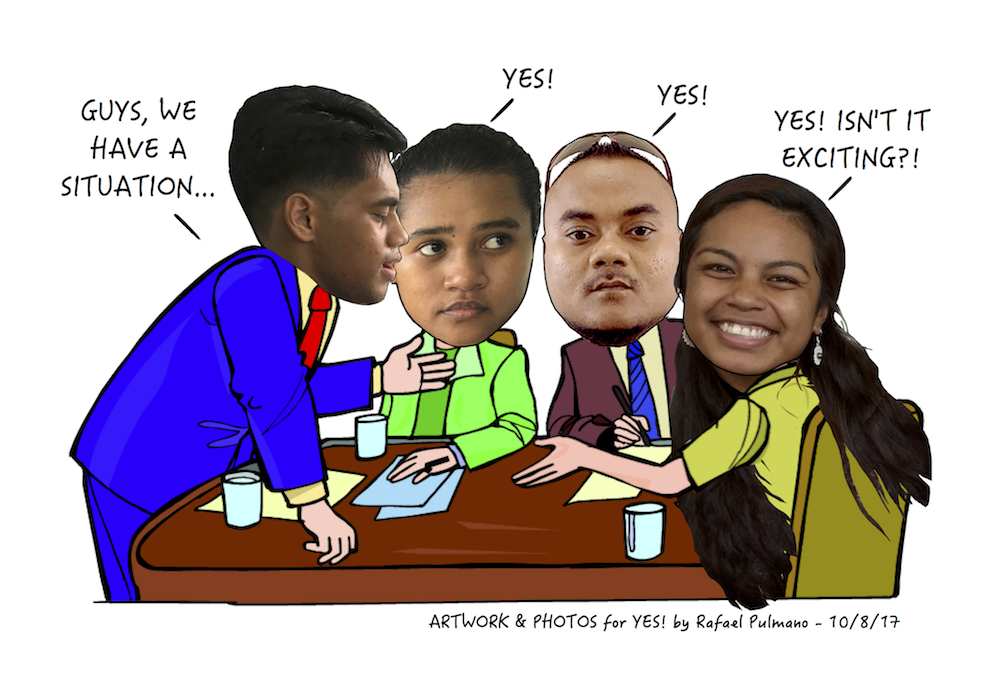Assessment
"An educated mind is a questioning mind. Or is it?" ~
T.S. Welti
Assessment Data for summer 2018

Accounting I students take online quiz in Schoology at the Learning Resource Center's computer laboratory.
(Click here FOR MORE PICTURES)
Our Young Executives in Action
by Rafael A. Pulmano, CPA, MBA
Officers of the Young Executives Society (YES!) met to discuss a financing problem, and decided to turn that problem into a business opportunity. A classic example of authentic assessment – READ full article here, or click on the picture below.

Assessment Data for spring semester 2018
- AC 131/1 – Accounting I, Section 1 (spring 2018)
- AC 131/2 – Accounting I, Section 2 (spring 2018)
- AC 220/1 – Accounting II, Section 1 (spring 2018)
Assessment Data – 2017 (fall and summer)
- AC 131/1 – Accounting I, Section 1 (fall 2017)
- AC 131/2 – Accounting I, Section 2 (fall 2017)
- AC 220/1 – Accounting II, Section 1 (fall 2017)
- AC 131/1 – Accounting I, Section 1 (summer 2017)
Achieving SLOs Through Collaborative Learning
I believe in collaborative learning. However, I seldom use it in the classes that I teach now. More time is usually consumed in this type of learning environment, yet I have schedules to follow and deadlines to meet. Then something happened in my class that forced me to reconsider.
Student Knowledge of SLOs
It used to be a one-way traffic. On day one, I explained the SLOs
in the syllabus. The students listened. I paused from time to time to
ask if they had questions. No reaction. Hmmm... There must be a way get
them excited about the SLOs. But how? Here's
how I did it.Related Links:
- Survey: Students' Awareness of SLOs | The work load is still relatively light. What will be happening in the coming weeks or months once new material starts piling up? Students need to realize sooner than later that they hold the key to their academic success. ~ Dr. Allain Bourgoin
- Survey: COM-FSM
Student Awareness of SLOs
| 73% of students have an understanding of SLOs, there were several
comments that indicated that there was a carry over from other classes
concerning SLOs. Most of the students in my classes are second year
students and have a better grasp of SLO, especially the education
majors. ~ Associate Professor
Ross Perkins
- Why statistics and what will you learn? | There appears to have been different interpretations of what is an "academic plan." The 75 students who were surveyed are almost all using English as an L2 language, different interpretations of words is not unusual and is potentially one factor in the variety of answers. ~ Professor Dana Lee Ling
- Summary of How Students are Informed of SLOs in My Classes | For the past eleven (11) years I have used the system summarized in this paper to ensure that students in these classes are aware of the SLOs (formerly known as objectives) in each class. ~ Professor Sue Moses
Peer Observation – Authentic Assessment
Summary
of Findings: The assessment
activity clearly showed that an active learning, which connects the
students to real working activity, was evident in this class, rather
than passive learning, which includes listening to lectures, taking
notes, reading text and memorizing notes or answers. See
complete report here.
Related Link:
Related Link:
- Authentic Assessment: Peer Observation - MS 099 class of Professor Snyther Biza | The group activity and the problem cases assigned by the instructor provided excellent simulation of actual situations that these students will most likely encounter in the future. Students can draw upon these experiences and use solutions developed in the classroom setting in other similar or related situations elsewhere.
Definition of Assessment
The College of Micronesia-FSM has adopted the definition of assessment from Thomas A. Angelo: (AAHE Bulletin, November 1995, P.7)Assessment
is an ongoing process aimed at understanding and improving student
learning. It involves making our expectations explicit and public;
setting appropriate criteria and high standards for learning quality;
systematically gathering, analyzing, and interpreting evidence to
determine how well performance matches those expectations and
standards; and using the resulting information to document, explain,
and improve performance. When it is embedded effectively within larger
institutional systems, assessment can help us focus our collective
attention, examine our assumptions, and create a shared academic
culture dedicated to assuring and improving the quality of higher
education.
Source: COM-FSM Institutional Assessment Plan (IAP) Handbook
Source: COM-FSM Institutional Assessment Plan (IAP) Handbook
for earlier assessment data, this
way
please ...
Assessment Archive
This page does not reflect an official position of the College of Micronesia-FSM
© 2018 Rafael A. Pulmano. Design by Andreas Viklund | Modified by Jason Cole
